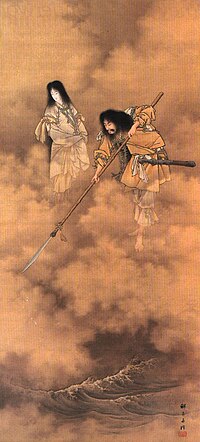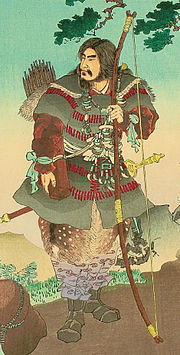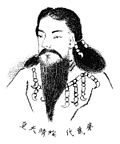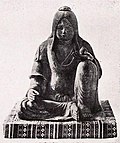The Kojiki (古事記, "Records of Ancient Matters" or "An Account of Ancient Matters"), also sometimes read as Furukotofumi or Furukotobumi, is an early Japanese...
50 KB (6,255 words) - 18:38, 30 July 2024
pantheon, she is also portrayed in Japan's earliest literary texts, the Kojiki (c. 712 CE) and the Nihon Shoki (720 CE), as the ruler (or one of the rulers)...
79 KB (8,446 words) - 23:15, 2 November 2024
The Kojiki-den (古事記伝) is a 44-volume commentary on the Kojiki written by the kokugaku scholar Motoori Norinaga. The Kojiki-den is a commentary on the Kojiki...
4 KB (373 words) - 01:08, 6 January 2024
Kojiki is an album by the new age artist Kitarō, which was nominated for a Grammy award in 1990. This album features the string section from the Skywalker...
4 KB (273 words) - 19:49, 4 January 2024
Izanagi (section In the Kojiki)
beginning of the current Japanese imperial family. His name is given in the Kojiki (c. 712 AD) both as Izanagi-no-Kami (伊邪那岐神) and Izanagi-no-Mikoto (伊邪那岐命)...
16 KB (1,815 words) - 01:37, 27 October 2024
Izanami (section In the Kojiki)
so Izanami is sometimes seen as a shinigami. Her name is given in the Kojiki (c. 712 AD) both as Izanami-no-Kami (伊弉冉神) and Izanami-no-Mikoto (伊邪那美命)...
15 KB (1,597 words) - 01:38, 27 October 2024
central deities of the imperial Japanese mythological cycle recorded in the Kojiki (c. 712 CE) and the Nihon Shoki (720 CE). One of the gazetteer reports (Fudoki)...
88 KB (10,695 words) - 09:19, 26 October 2024
for Japanese myths, as they are recognized today, are the Kojiki and the Nihon Shoki. The Kojiki, or "Record of Ancient Matters," is the oldest surviving...
28 KB (3,643 words) - 07:26, 29 October 2024
Ōkuninushi (section In the Kojiki)
He is one of the central deities in the cycle of myths recorded in the Kojiki (c. 712 CE) and the Nihon Shoki (720 CE) alongside the sun goddess Amaterasu...
34 KB (4,758 words) - 17:32, 20 September 2024
Kojiki Tōsho (古事記頭書) is a three-volume commentary on the Kojiki written by the Edo period kokugaku scholar Kamo no Mabuchi in 1757. It is also known as...
4 KB (357 words) - 09:09, 18 August 2024
The Kojiki Uragaki (古事記裏書) is a one-volume commentary on the Kojiki of unknown authorship and date. It survives in a single manuscript held by the Ise...
3 KB (366 words) - 04:31, 30 August 2023
Kojiki Taishō (乞食大将, Kojiki Taishō) is jidaigeki novel written by Jirō Osaragi in 1945. The novel deals with the warlord Gotō Matabei's life during the...
5 KB (260 words) - 06:53, 12 December 2023
was the legendary first emperor of Japan according to the Nihon Shoki and Kojiki. His ascension is traditionally dated as 660 BC. In Japanese mythology,...
30 KB (3,978 words) - 18:08, 7 November 2024
Umashiashikabihikoji (section In the Kojiki)
Reed Lad". He is in the Kojiki and Nihongi. These are ancient Japanese texts. He is one of the earliest gods in Shinto. The Kojiki calls this deity Umashiashikabihikoji...
3 KB (394 words) - 03:26, 25 June 2024
books of Shinto The main two books are the Kojiki and the Nihon Shoki. collectively called the Kiki (記紀) Kojiki One of the Kiki. Nihon Shoki One of the Kiki...
19 KB (2,249 words) - 14:05, 9 October 2024
Hare of Inaba (section Kojiki version)
Inaba region. One version of the tale of the Hare of Inaba is found in the Kojiki, the oldest extant chronicle in Japan, which dates from early in the 8th...
12 KB (1,145 words) - 05:21, 12 July 2024
In Shinto faith, Kuninotokotachi (国之常立神, Kuninotokotachi-no-Kami, in Kojiki) (国常立尊, Kuninotokotachi-no-Mikoto, in Nihon Shoki (no-Mikoto here being an...
3 KB (300 words) - 17:34, 19 September 2024
Center of Heaven") is a deity (kami) in Japanese mythology, portrayed in the Kojiki and the Nihon Shoki as the first or one of the first deities who manifested...
23 KB (2,585 words) - 15:14, 20 September 2024
(阿遅志貴高日子根神; Man'yōgana: 阿治志貴多迦比古泥能迦微; O.J.: Adisiki2takapi1ko1ne) in the Kojiki, while the Nihon Shoki consistently calls him 'Ajisukitakahikone-no-Kami'...
12 KB (1,087 words) - 01:33, 28 November 2023
Hieda no Are (section Kojiki)
primarily known for being instrumental to the compilation of the Japanese text Kojiki in 712. While birth and date are unknown, Are was active during the late...
3 KB (315 words) - 16:52, 23 April 2024
(日本紀, "Japanese Chronicles"). It is more elaborate and detailed than the Kojiki, the oldest, and has proven to be an important tool for historians and archaeologists...
21 KB (2,280 words) - 19:06, 5 October 2024
and given birth to the second emperor, Emperor Suizei. According to the Kojiki, when Kamuyamato-Iwarebiko (also known as Emperor Jimmu) was searching for...
32 KB (5,359 words) - 20:19, 21 September 2024
Takamagahara (section According to the Kojiki)
descended from heaven to pacify and perfect this world. In the beginning of the Kojiki (Records of Ancient Matters), Takamagahara is mentioned as the birthplace...
25 KB (2,973 words) - 17:58, 20 September 2024
Toyotama-hime (Japanese: 豊玉姫) is a goddess in Japanese mythology who appears in Kojiki and Nihon Shoki. She is the daughter of the sea deity, Watatsumi, and the...
12 KB (2,004 words) - 13:07, 22 June 2024
Kuniumi (section According to the Kojiki)
the emergence of the Japanese archipelago, of islands, as narrated in the Kojiki and Nihon Shoki. According to this legend, after the creation of Heaven...
10 KB (1,250 words) - 04:51, 7 May 2024
accounts in the Nihon Shoki. Tsukuyomi does not have such significance in the Kojiki, in which there is a similar tale about Susanoo-no-Mikoto killing a similar...
5 KB (560 words) - 00:25, 2 September 2024
historians as his actual existence is disputed. A legendary account from the Kojiki states that Suizei became emperor after receiving the title of crown prince...
14 KB (2,282 words) - 17:32, 24 September 2024
List of minor planets: 5001–6000 (redirect from 5454 Kojiki)
November 3, 1975 Nauchnij T. M. Smirnova FLO 4.6 km MPC · JPL 5454 Kojiki 1977 EW5 Kojiki March 12, 1977 Kiso H. Kosai, K. Furukawa HYG 17 km MPC · JPL 5455...
232 KB (302 words) - 20:43, 4 November 2024
Ukanomitama (宇迦之御魂神 – Mighty Soul of Sustenance - Kojiki) (倉稲魂命 - Nihongi) is a kami in classical Japanese mythology, associated with food and agriculture...
4 KB (1,020 words) - 17:43, 11 September 2024















